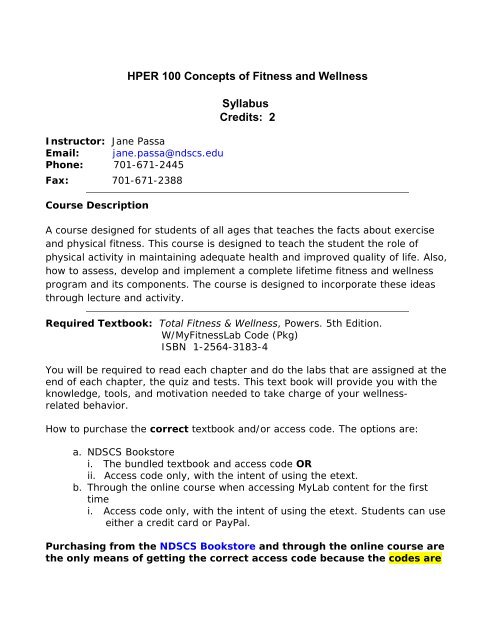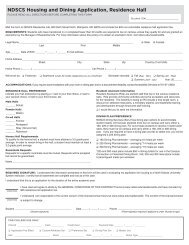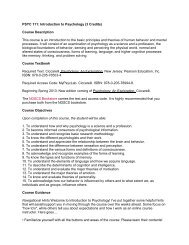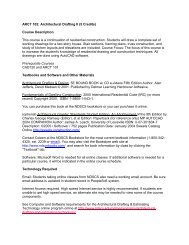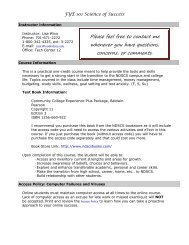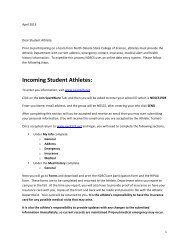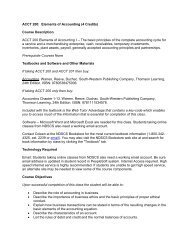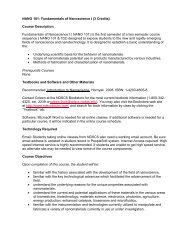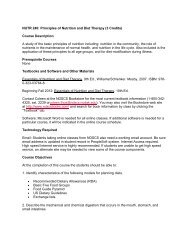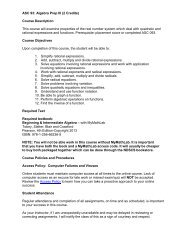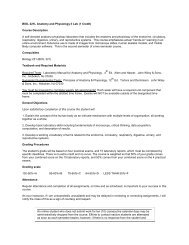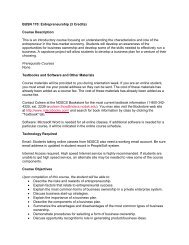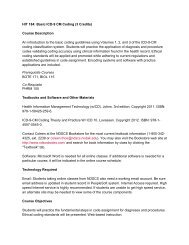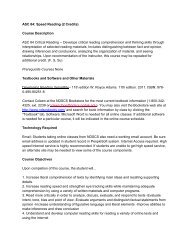HPER 100 Concepts of Fitness and Wellness Syllabus Credits: 2
HPER 100 Concepts of Fitness and Wellness Syllabus Credits: 2
HPER 100 Concepts of Fitness and Wellness Syllabus Credits: 2
You also want an ePaper? Increase the reach of your titles
YUMPU automatically turns print PDFs into web optimized ePapers that Google loves.
<strong>HPER</strong> <strong>100</strong> <strong>Concepts</strong> <strong>of</strong> <strong>Fitness</strong> <strong>and</strong> <strong>Wellness</strong>Instructor: Jane PassaEmail: jane.passa@ndscs.eduPhone: 701-671-2445Fax: 701-671-2388Course Description<strong>Syllabus</strong><strong>Credits</strong>: 2A course designed for students <strong>of</strong> all ages that teaches the facts about exercise<strong>and</strong> physical fitness. This course is designed to teach the student the role <strong>of</strong>physical activity in maintaining adequate health <strong>and</strong> improved quality <strong>of</strong> life. Also,how to assess, develop <strong>and</strong> implement a complete lifetime fitness <strong>and</strong> wellnessprogram <strong>and</strong> its components. The course is designed to incorporate these ideasthrough lecture <strong>and</strong> activity.Required Textbook: Total <strong>Fitness</strong> & <strong>Wellness</strong>, Powers. 5th Edition.W/My<strong>Fitness</strong>Lab Code (Pkg)ISBN 1-2564-3183-4You will be required to read each chapter <strong>and</strong> do the labs that are assigned at theend <strong>of</strong> each chapter, the quiz <strong>and</strong> tests. This text book will provide you with theknowledge, tools, <strong>and</strong> motivation needed to take charge <strong>of</strong> your wellnessrelatedbehavior.How to purchase the correct textbook <strong>and</strong>/or access code. The options are:a. NDSCS Bookstorei. The bundled textbook <strong>and</strong> access code ORii. Access code only, with the intent <strong>of</strong> using the etext.b. Through the online course when accessing MyLab content for the firsttimei. Access code only, with the intent <strong>of</strong> using the etext. Students can useeither a credit card or PayPal.Purchasing from the NDSCS Bookstore <strong>and</strong> through the online course arethe only means <strong>of</strong> getting the correct access code because the codes are
specific to NDSCS/Pearson eCollege coursesLearning Outcomes• To enable the students to underst<strong>and</strong> the role <strong>of</strong> physical activity <strong>and</strong>wellness in our society.• To help the student develop an underst<strong>and</strong>ing <strong>of</strong> the human body, itsstructure, function, capabilities, <strong>and</strong> limitations in relation to physicalactivity <strong>and</strong> wellness.• To acquaint the student with responses <strong>and</strong> adaptations <strong>of</strong> the body toexercise <strong>and</strong> training.• To assist the student in designing an effective program <strong>of</strong> personal exercisefor maintaining physical fitness <strong>and</strong> wellness over a lifetime.Course Policies <strong>and</strong> ProceduresAccess Policy: Computer Failures <strong>and</strong> VirusesOnline students must maintain computer access at all times to the online course.Lack <strong>of</strong> computer access as an excuse for late work or missed exam/quiz will NOTbe accepted. Review the Access Policy (Appendix A) to learn how you can take aproactive approach to your online success.Student Attendance:Regular attendance <strong>and</strong> completion <strong>of</strong> all assignments, on time <strong>and</strong> as scheduled,is important to your success in this course.As your instructor, if I am unexpectedly unavailable <strong>and</strong> may be delayed inreviewing or correcting assignments, I will notify the class <strong>of</strong> this as a sign <strong>of</strong>courtesy <strong>and</strong> respect.An online student who does not submit class work for ten(10) consecutive calendar days may be dropped from thecourse. Efforts to contact inactive students are attempted assoon as each semester begins; however, if there is noresponse from the student <strong>and</strong> inactivity continues, a drop
will be enacted.The following action may be taken regarding irregularattendance:1) Dropped from a course or program;2) Course grade may be lowered;3) Termination <strong>of</strong> financial aid assistance;4) Cancellation <strong>of</strong> registration;5) Restriction from extra-curricular activities; or6) Any other judgments deemed necessary.See the entire NDSCS Attendance PolicyUpdated policy effective Summer 2007Online Student Participation <strong>and</strong> Conduct GuidelinesThe practices <strong>of</strong> courtesy <strong>and</strong> respect that apply in the traditional classroom alsoapply online. However, the expectations <strong>and</strong> practice differ in the onlineclassroom to greater extent. Review the Online Student Participation <strong>and</strong>Conduct Guidelines (Appendix B) to learn <strong>of</strong> these expectations.AssignmentsPlease follow the order <strong>of</strong> chapters as listed within the Course Navigation area(located at the left.) Each chapter will build onto the next one <strong>and</strong> will beaccessible according to the posted Schedule.Assignments <strong>and</strong> quizzes within each chapter are due within specified timeframes. Refer to the Schedule for specific due dates.Assignments not completed by the specified deadline but submitted late will have2 points deducted for each day late at instructor's discretion.No points will be assigned for incomplete assignments. Be prepared to spend atleast four (4) hours per week in the online class, studying, <strong>and</strong> completingassignments.Submitting AssignmentsAll assignments should be turned in via Dropbox unless otherwise specified. Youare strongly encouraged to make hard copies <strong>of</strong> your assignments <strong>and</strong>communications with the instructor to avoid losing data in the case <strong>of</strong> technical
issues. At the first sign <strong>of</strong> problems, contact your Internet Service Provider (ISP)immediately.It is your responsibility to access the class on another computer in the event <strong>of</strong>hardware or s<strong>of</strong>tware problems. If your problems are not cleared up within 12hours, contact the instructor by telephone to make other arrangements.Online DiscussionsThe online discussions are required activities, <strong>and</strong> full participation is essential foryour success <strong>of</strong> this course. Refer to the specific Discussion expectations underDiscussion Grading Criteria.Student Email AccountsNDSCS students are to setup an NDSCS Live email account <strong>and</strong> use itexclusively to ensure the lines <strong>of</strong> communication with your instructor <strong>and</strong> NDSCSare not broken, which <strong>of</strong>ten happens with other email providers. You can setupyour email account at: http://www.ndscs.edu/currentstudents/email/live/.The NDSCS e-mail system provides students with an entire suite <strong>of</strong> services suchas:• 25 gigabytes <strong>of</strong> file storage• web-based Micros<strong>of</strong>t Office products• file sharing• instant messaging <strong>and</strong> moreOnce you have set up your "Live" account, be sure to update your emailinformation for your online courses. After logging into eCollege, click My Pr<strong>of</strong>ilein the upper right corner, <strong>and</strong> enter the new address so you continue to receivecommunications from the college.If you need help, contact the NDSCS IT Helpdesk at 800-342-4325 ext 2523 orndscs.helpdesk@ndscs.edu.Student-Instructor CommunicationsWhile an online class is available 24 hours a day <strong>and</strong> <strong>of</strong>fers greater flexibility forthe student <strong>and</strong> instructor, keep in mind that your instructor will not be available24 hours a day. I will check my email, voicemail, <strong>and</strong> online Office messages ona regular basis, but there may be times when I am unavailable due to othercommitments <strong>and</strong> job responsibilities. I will respond to email, voicemail, or onlineOffice messages as time allows. As a general rule, you can expect your directquestion to be answered within 24 hours during week days.
When sending an email, please include your full name so I know to whom I'mresponding. Often, the email addresses do not indicate who is sending themessage.Grading PolicyOnline Exams: Online exams are part <strong>of</strong> this class to assess your progress <strong>and</strong>whether you have met the course objectives. Academic integrity is important toNDSCS, myself the instructor, <strong>and</strong> yourself the student. You do not need aproctor for the tests.Assignment Due Dates: A Lab, <strong>and</strong> a 10 point Quiz will be given in eachchapter <strong>and</strong> must be completed within the time-frame for the chapters as listed inthe assignment due section <strong>of</strong> the course home.Lab Assignments: Each chapter contains lab assignments that are on thepublishers web site. You should do the labs that require calculations on the website first. Then transfer the results to the corresponding Word documents listedunder each chapter. Lab Assignments are to be submitted through the Dropboxwhen complete.Grading CriteriaLabs: Students will be required to complete the assigned labs in the time allotted.Tests/Quiz: The tests/Quiz will consist <strong>of</strong> multiple choice <strong>and</strong> T/F questions <strong>and</strong>are open book with a half hour limit on each quiz or test.Learning Objectives: After studying each chapter, students should be able todefine the learning objectives from that chapter.10 points per quiz Quizzes10 points for each lab Labs10 points for each question Threaded DiscussionGrading ScaleA90% or higherB 80-89%C 70-79%D 60-69%
F Less than 60%Discussion Grading CriteriaYou are expected to respond to discussion questions <strong>and</strong> to two <strong>of</strong> yourclassmates. Each posting must be relevant <strong>and</strong> substantive. Responses toclassmates must also be relevant <strong>and</strong> substantive (more than "I agree.")
Threaded Discussion ParticipationUnsatisfactory0 pointsNeeds Work5 pointsSatisfactory7 pointsVery Good10 pointsLess than 3postings aremade in thediscussion boardarea.3-5 entries: Eachentry is posted but isbrief (less than twosentences)a) It has little in theway <strong>of</strong> thoughtful,substantive ideasconcerning theassignment <strong>and</strong>/orcourse contentrelated to it.AND/ORb) It fails to respondto fellow student(s)or in response to afellow student it isquite simple <strong>and</strong> justa personal remarknot a substantivereply (ex- “Good. Ireally liked yourcomment.)3-5 entries: Eachentry has 3 or moresentences:a) Each containsthoughtful,substantive ideasconcerningassignment <strong>and</strong>/orcourse contentrelated to it;AND/ORb) The entries areresponsive to at leasttwo other classmateswith detailed remarksabout thatindividual’s writing ordiscussion response.3-5 entries: Eachentry includes one orboth characteristics inthe 7 points box plus:a) Entries include anoutside resource, or arelevant, specific reallife application;AND/ORb) Your response toclass member(s)clearly indicates yourposition in relation towhat fellowstudents(s) said orwrote (e.g. –agreeing,disagreeing, addingto, modifying,extending orquestioning it.)Tie to Program Assessment OutcomesThis course will support written <strong>and</strong> oral communications <strong>and</strong> wellness outcomes.Academic IntegrityIntegrity is an NDSCS core value <strong>and</strong> there is an expectation that all students, asmembers <strong>of</strong> the college community, adhere to the highest levels <strong>of</strong> academicintegrity.Dishonesty in class, laboratory, shop work or tests is regarded as a serious<strong>of</strong>fense <strong>and</strong> is subject to disciplinary action by the instructor <strong>and</strong> dean <strong>of</strong> therespective division. For more information, refer to the NDSCS Student Planneror College Catalog under College Policies <strong>and</strong> Basic Regulations <strong>of</strong> Conduct.
Types <strong>of</strong> Misconduct:Cheating: Intentionally using or attempting to use unauthorized materials,information, or study aids in any academic exercise.Fabrication: Intentionally <strong>and</strong> unauthorized falsification or invention <strong>of</strong> anyinformation or citation in an academic exercise.Facilitating academic dishonesty: Intentionally or knowingly helping orattempting to help another to commit an act <strong>of</strong> academic dishonesty.Plagiarism: Intentionally or knowingly representing the words or ideas <strong>of</strong> anotheras one’s own in any academic exercise.Help DeskFor technical problems like not being able to view a page, slowness issues,problems viewing video or hearing audio, things not working as they should,please contact the 24/7 eCollege helpdesk at (877)740-2213, or email them by athelpdesk@ndscsonline.org. They do not answer homework questions; send thoseto me.Disabilities <strong>and</strong> Special NeedsIf you have a disability for which you are or may be requesting anaccommodation, you are encouraged to contact the Student AccessibilityCoordinator, Room 215, Mildred Johnson Library, 701-671-2623, as early aspossible in the term. Or call toll free at 1-800-342-4325 (ext. 32623).
Appendix AACCESS POLICY: COMPUTER FAILURES AND VIRUSESOnline students must maintain access at all times. The responsibility to maintain Web access restswith each individual student. Please read carefully the following course policy.• Each student must maintain consistent access to Web based course materials via a welloperating computer <strong>and</strong> reliable Internet Service Provider (ISP).• As an online student you are committed to have regular access, or if your service isinterrupted, to have an alternate available.• If service is interrupted for any reason for more than 24 hours (power outage, Virusattack) or during an exam, assignment submission period, or other, each student musthave a back-up plan in place.• Work with your computer support to resolve problems specific to your computer.Make to have the correct telephone number or email address to contact them BEFORE the coursebegins.• The NDSCS Help Desk may be able to help you identify <strong>and</strong> correct a virus: 1-800-342-4325 ext. 3-2523.• Report other technical problems to the eCollege Help Desk, making sure you have a copy<strong>of</strong> all error messages <strong>and</strong> information about the specific problem to provide thetechnician. Keep a log <strong>of</strong> the date, time, <strong>and</strong> technician.eCollege Help Desk (24/7 support)helpdesk@ndscsonline.org or call (877) 740-2213• Realize that your instructor is NOT going to accept lack <strong>of</strong> access as an excuse for latework or missed exam/quiz access.• Online active learners are proactive. Before class begins,ooooLocate a 24 hour Kinko's nearest you with work stations (check cost <strong>and</strong> testaccess).Make arrangements with a friend to use their computer as a back-up.Check out Internet access at your nearest library <strong>and</strong> find out the hours.Inquire at a public school for access to their computer lab or library.• Complete <strong>and</strong> submit your work early.• Don't wait until the deadline to submit your work in case you do have a problem(technical or other).• Complete Bits & Bytes for Online Success, a guide to student achievement in the onlineclassroom <strong>and</strong> beyond. Alternatively, complete the "Student Orientation Tutorial" whichis listed in the Special Courses section at the top <strong>of</strong> your online home page just after youlog in.*Adapted with Permission from Dr. C. A. Keller, San Antonio College
Appendix BONLINE STUDENT PARTICIPATION AND CONDUCT GUIDELINESOnline courses are based on the premise that students learn best in a community. The instructorplays an important role, but this is a different role than most instructors play in the traditional,face-to-face classroom. While you may see a shift in the way classes work, you'll also notice thatsome things don't change: the practices <strong>of</strong> courtesy <strong>and</strong> respect that apply in the ordinaryclassroom also apply online, <strong>and</strong> may actually require more attention in this venue. Here are someguidelines:1. Get involved. In the online environment, it's not enough to show up! Your voice mustbe heard in order to show your presence. Your comments are needed to add to theinformation, the shared learning, <strong>and</strong> the sense <strong>of</strong> community in each class.2. Be persistent. Remember that for many this is a fairly new environment. Eachinstructor still sets the rules, <strong>and</strong> you need to abide by them; however, if you run intoany difficulties, don't wait! Send your instructor an email immediately or post in theDiscussion Area. Most problems are easily solved, but your instructor <strong>and</strong> your fellowstudents need to hear from you before they can help.3. Share tips, helps, <strong>and</strong> questions. For many, taking online courses is a new experience.There are no dumb questions, <strong>and</strong> even if you think your solution is obvious, pleaseshare it by posting it in the Discussion Area. For every student who asks a question,there are 10 others wanting to know the same thing.4. Think before you push the Send button. Did you say just what you meant? How will theperson on the other end read the words? While you can't anticipate all reactions, doread over what you've written before you send it.5. Consider the context. Remember that we can't see the grin on your face when youmake a sarcastic comment, we can't see the concern on your face if you only say acouple <strong>of</strong> words, <strong>and</strong> we can't read your mind <strong>and</strong> fill in the gaps if you abbreviate yourcomments. So: help us "see" you by explaining your ideas fully.6. Ask for feedback. Not sure how your ideas <strong>and</strong> comments will be taken? Rememberthere's a person on the other side. If you disagree with what someone has said,practice all your communication skills as you express that disagreement. "Flaming," orflying <strong>of</strong>f the h<strong>and</strong>le <strong>and</strong> ranting at someone is unacceptable; it is the equivalent <strong>of</strong>having a tantrum, something most <strong>of</strong> us wouldn't do in an onsite, face to faceclassroom.7. Act with respect. Any discriminatory, derogatory or inappropriate comments areunacceptable <strong>and</strong> subject to the same disciplinary action that they would receive if theyoccurred in the face to face classroom. If you have concerns about something that hasbeen said, please contact your instructor.8. Exercise integrity. Plagiarism, cheating, <strong>and</strong> other violations <strong>of</strong> ethical student behaviorare serious actions in a learning community. See Academic Integrity Policy in thecourse syllabus.9. Recognize the consequences. Consequences <strong>of</strong> online student behavior that contradictsthe NDSCS Academic Integrity policy will be addressed on an individual basis <strong>and</strong> inaccordance with NDSCS Academic Integrity policy. Refer to the NDSCS Student Planner
or College Catalog for more information.*Adapted with permission from Dr. C. A. Keller, San Antonio College


